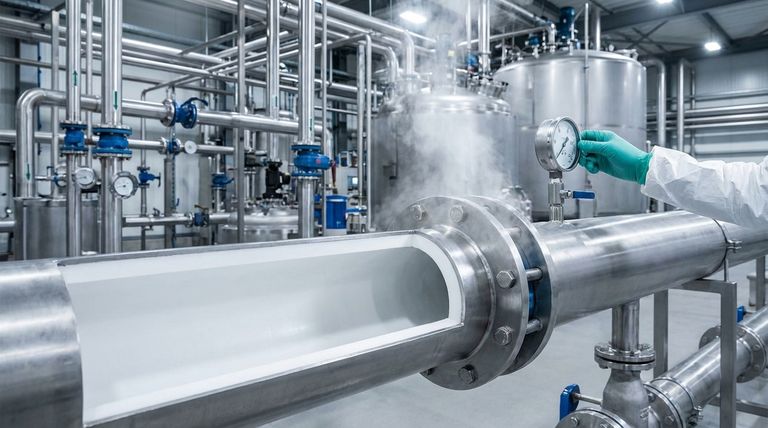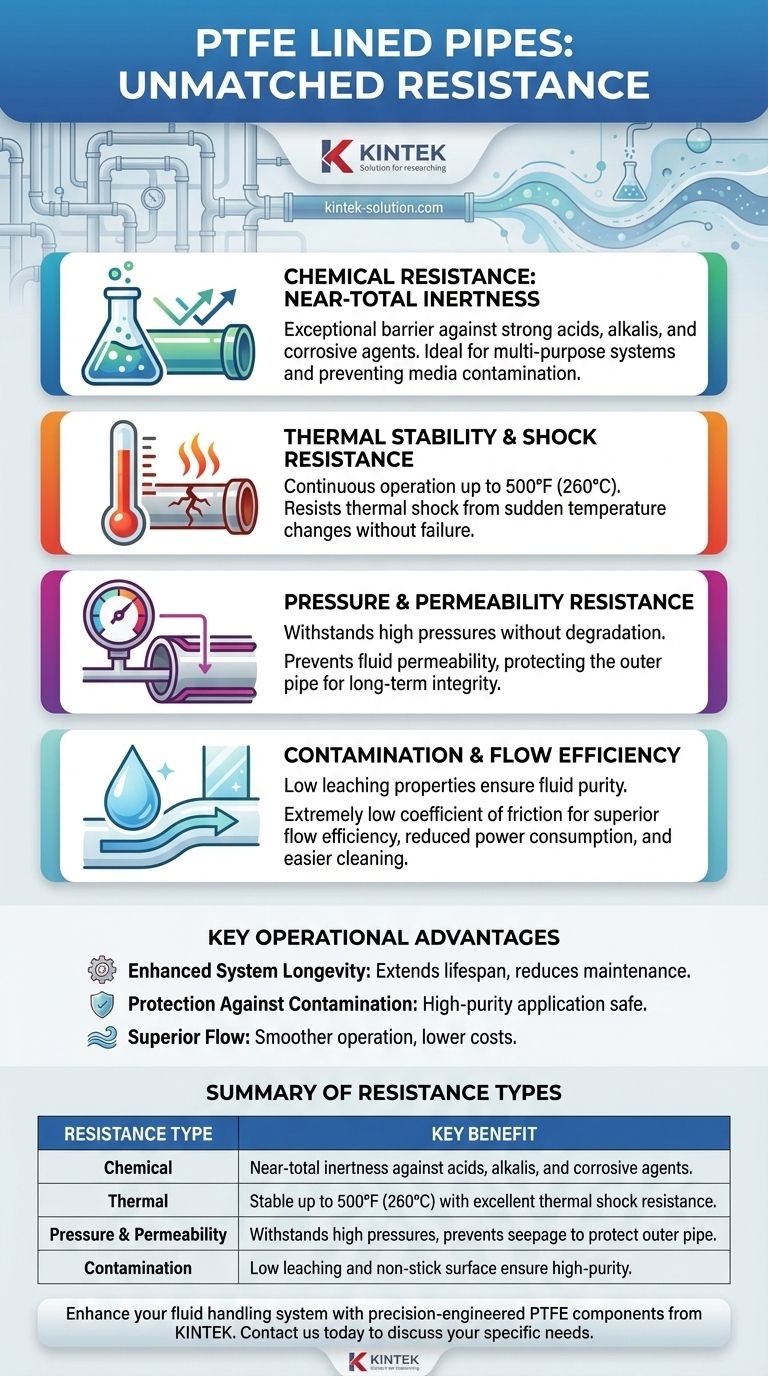PTFE lined pipes are engineered to resist a unique combination of chemical, thermal, and physical stresses. They provide exceptional resistance to aggressive chemicals like acids and alkalis, high temperatures, thermal shock, high pressure, and permeability, making them a cornerstone material for demanding industrial fluid handling.
The core value of a PTFE lined pipe is not just its resistance to a single factor, but its ability to provide a comprehensive and inert barrier. This protects both the integrity of the piping system and the purity of the medium being transported.

Unpacking the Core Resistance Properties
To understand if this material is right for your application, it's essential to break down its specific resistance characteristics. Each one plays a critical role in ensuring system reliability and safety.
Unmatched Chemical Inertness
The primary advantage of PTFE is its near-total chemical inertness. The lining creates a barrier that is resistant to a vast range of substances, including strong acids, alkalis, and other corrosive agents.
This makes it an ideal choice for multi-purpose systems handling various chemical mixtures, as it eliminates the risk of corrosion and media contamination. The only notable exceptions are elemental fluorine and some extreme reducing agents.
High-Temperature and Thermal Stability
PTFE lined systems can operate reliably at continuous high temperatures, with some capable of handling up to 500°F (260°C).
Equally important is their resistance to thermal shock. This means the material will not fail or deform when subjected to sudden and extreme temperature changes, a common point of failure for less robust materials.
Robust Pressure and Permeability Resistance
While the outer pipe provides the primary structural strength, the PTFE lining is engineered to withstand high pressures without degradation.
Furthermore, it offers high resistance to permeability. This prevents the process fluid from seeping through the liner and attacking the external steel or iron pipe, which is critical for long-term system integrity.
Beyond Resistance: Key Operational Advantages
The benefits of a PTFE lining extend beyond simple durability. Its physical properties create significant operational efficiencies that contribute to lower costs and higher performance.
Superior Flow Efficiency
PTFE has an extremely low coefficient of friction, creating a non-stick surface. This allows for a much smoother, uninterrupted flow of fluids.
This reduction in internal friction can lead to lower power consumption for pumps and makes the system easier to clean, preventing product buildup and contamination.
Protection Against Contamination
In high-purity applications, such as pharmaceuticals or semiconductors, preventing contamination is paramount. PTFE is an excellent choice due to its low leaching properties.
The material does not shed particles or leach chemicals into the media, ensuring the fluid remains pure throughout the process.
Enhanced System Longevity
The PTFE lining acts as a constant protective barrier for the pipe's external structure. By preventing internal corrosion and wear, it dramatically extends the lifespan of the entire piping system.
This results in a lower probability of failure, reduced maintenance requirements, and lower long-term operational expenses compared to using specialty metal alloys.
Understanding the Trade-offs and Considerations
While incredibly capable, a PTFE lined system is more than just its liner. Success depends on understanding how the components work together and what limitations exist.
The Liner and Outer Pipe as a System
The PTFE provides the chemical and thermal resistance, but the outer pipe (typically carbon steel, stainless steel, or ductile iron) provides the mechanical strength and pressure rating. The performance of the entire unit depends on the synergy between these two components.
Importance of Surface and Fabrication Quality
For a lining to perform without failure, the internal surface of the outer pipe must be prepared to a specific roughness. Improper fabrication can lead to voids or poor adhesion, creating a critical point of failure. It is not a simple drop-in component but a precisely engineered system.
Chemical and Physical Limitations
While its chemical resistance is broad, it is not absolute. Always verify that PTFE is compatible with your specific chemical profile, especially when dealing with fluorine or powerful alkali metals at high temperatures.
Making the Right Choice for Your Goal
Selecting a piping material is a critical design decision. Use these points to guide your choice based on your primary objective.
- If your primary focus is handling aggressive chemicals: PTFE provides a nearly inert barrier, protecting your structural pipe from corrosion and preventing product contamination.
- If your primary focus is high-purity processes: Its low-leaching and non-stick properties ensure the absolute integrity of the medium being transported.
- If your primary focus is system longevity and low maintenance: The protective lining drastically reduces internal wear, extending the system's life and minimizing operational costs.
- If your primary focus is thermal stability: Its ability to handle high temperatures and resist thermal shock makes it a reliable choice for processes with significant temperature fluctuations.
By understanding its comprehensive resistance profile, you can confidently specify PTFE lined pipe to enhance the safety, efficiency, and durability of your critical fluid systems.
Summary Table:
| Resistance Type | Key Benefit |
|---|---|
| Chemical | Near-total inertness against acids, alkalis, and corrosive agents |
| Thermal | Stable performance up to 500°F (260°C) with excellent thermal shock resistance |
| Pressure & Permeability | Withstands high pressures and prevents fluid seepage to protect the outer pipe |
| Contamination | Low leaching and non-stick surface ensure high-purity fluid transport |
Enhance your fluid handling system with precision-engineered PTFE components from KINTEK.
Whether you're in the semiconductor, medical, laboratory, or industrial sector, our custom-fabricated PTFE seals, liners, labware, and lined pipes are designed to deliver unmatched chemical resistance, thermal stability, and longevity. From prototypes to high-volume orders, we prioritize precision and reliability to protect your processes and products.
Contact us today to discuss your specific needs and discover how KINTEK's solutions can optimize your operations.
Visual Guide

Related Products
- Custom PTFE Parts Manufacturer for Teflon Parts and PTFE Tweezers
- Custom PTFE Parts Manufacturer for Teflon Containers and Components
- Custom PTFE Measuring Cylinders for Advanced Scientific and Industrial Applications
- Custom PTFE Square Trays for Industrial and Laboratory Use
- Custom PTFE Sleeves and Hollow Rods for Advanced Applications
People Also Ask
- What is the purpose of PTFE piston guide rings? Prevent Costly Wear in Your Equipment
- What are the main benefits of using PTFE in cables and wires? Achieve Unmatched Performance in Extreme Environments
- What are the general functions of bellows in mechanical systems? Achieve Superior System Reliability
- How can the hardness of PTFE be increased? Reinforce with Fillers for Demanding Applications
- What are the applications of Teflon in the automotive industry? Enhance Vehicle Performance & Durability
- How does PTFE packing contribute to equipment efficiency and maintenance? Boost Performance & Reduce Downtime
- What are the cost-related advantages of PTFE sliding pipe supports? Reduce Total Cost of Ownership
- Why is symmetry and balance important when installing PTFE gasket seals? Ensure a Perfect, Leak-Proof Seal



















